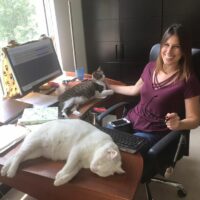I don’t know her name. I call her Smoky because I rarely see her without a cigarette clasped between her index and middle fingers or dangling from her lips. A tall African America woman perhaps in her 60’s with few teeth and big brown eyes, Smoky lives in a nice apartment in West Hollywood as part of the city’s Inclusionary Housing Program which requires 20% of units in new housing projects to be affordable for income-qualifying households.
I first met Smoky around 2010. Most days she could be found sitting on the rock wall in front of Pinches Taco’s at the corner of Havenhurst Drive and Sunset Boulevard or on one of the chairs outside the restaurant with her long legs crossed, left hand in her lap, right elbow resting on her knee, a cigarette in her hand. She typically wore a long robe or house dress as we call them in the South with a hooded sweatshirt on top. She was fascinated with Mac. Whenever she purchased something from Pinches, she would say in a long draw, “Mac, want some chhhhicken?” Not one to turn down any part of his favorite bird, Mac grabbed it from her outstretched hand. Turning her generosity toward me, “Want a ciggggarette?” She giggled each time I turned her down.
I rarely saw signs of mental illness. I saw a sweet woman with a low IQ whose face lit up when someone paid attention to her. My friend Jason was not so lucky. Sharing the parking lot with Pinches Tacos is a doggie daycare named Posh Pets. Posh opens at 7:00 a.m. and Jason was usually the first client to drop off his dog U.B. It was fall and the time had changed so the sun was just coming up when he heard someone yelling nonsense. He looked in the direction of the screaming to see Smoky pull her nightgown over her head to expose her naked body. Jason froze. What do you do in such a situation? Visibly shaken, he got in his car and drove away.
During this time, I volunteered every Tuesday at Hollywood United Methodist Church where we handed out bag lunches, socks, and toiletries and offered our guests donated shoes and clothing. I saw what I assume is only the tip of the mental illness iceberg. The end of the month was usually worse than the first couple of weeks because the mostly homeless who joined us had either lost or used up the drugs that helped them keep their illnesses in check.
Mac and I moved from the neighborhood in 2016, and our only interaction with Smoky was an occasional sighting through a car window as we drove past Pinches. I recently moved back to West, just a few streets East of where Mac and I used to live. Smoky too has moved East. She now spends her days on the brick wall of the shopping complex halfway between Crescent Heights and Laurel. Her pose is the same, legs crossed, elbow on top leg, holding a cigarette. She looks ill, physically ill. She’s lost probably eighty pounds. Her legs are so thin that when she crosses them, the foot of the top legs scrapes the ground because she has no fat to create any lift. She no longer wears a house dress. She’s in baggy sweat pants obviously covering stick-thin legs. She still wears the hooded sweatshirt to cover what I assume are equally thin arms.
I tried to say hi to Smokey the first time I saw her but I saw no recognition in her brown eyes that looked even larger in her sunken face. Perhaps she just knew me through Mac. I’m used to that. Or perhaps she recognized me and didn’t want to interact. I followed her lead and didn’t engage her when I walked by until one day she said, “How yaaa dooooing?” My face lit up. “I’m good Smokey. How are you?”
“Where’s Maaac? Does he still like chhhhicken?”
“He’s gone.” I smile sweetly as I touch my hands to my heart.
“I’m sorrrry. Want a ciggggarette?”
“No, I’m good, but thanks. Good to see you.”
“Good to see youuuu too.”
Ah, my friend was back but not for long. The next time I saw her, I said “How you doing Smoky?” She looked at me, and the evil in her eyes unnerved me. I passed by knowing not to say more.
I see her every day, and we’ve developed a rhythm. If she looks my way, I smile and wave. It’s not a typical wave with my wrists. I simply hold my hand steady and wave with my four fingers held close together. Most of the time, she’ll smile a wide grin showing the minimal teeth in her mouth. Sometimes she will ask me how I’m doing. Most of the time, she turns her head the other way when she sees me. That’s my sign to walk on by…. not talking, not even a four-finger wave.
It makes me sad. I don’t like ignoring someone that could use a kind smile, but I’ve let that be her choice. It’s also taught me about authentic interaction. When I don’t want to talk, I can’t go as far as Smoky does and just ignore the person greeting me. But I don’t have to engage in a longer inauthentic conversation. My version of Smoky’s turning her head can be a polite one or two-word reply. And with Smoky’s smile, you get a genuine exchange.






